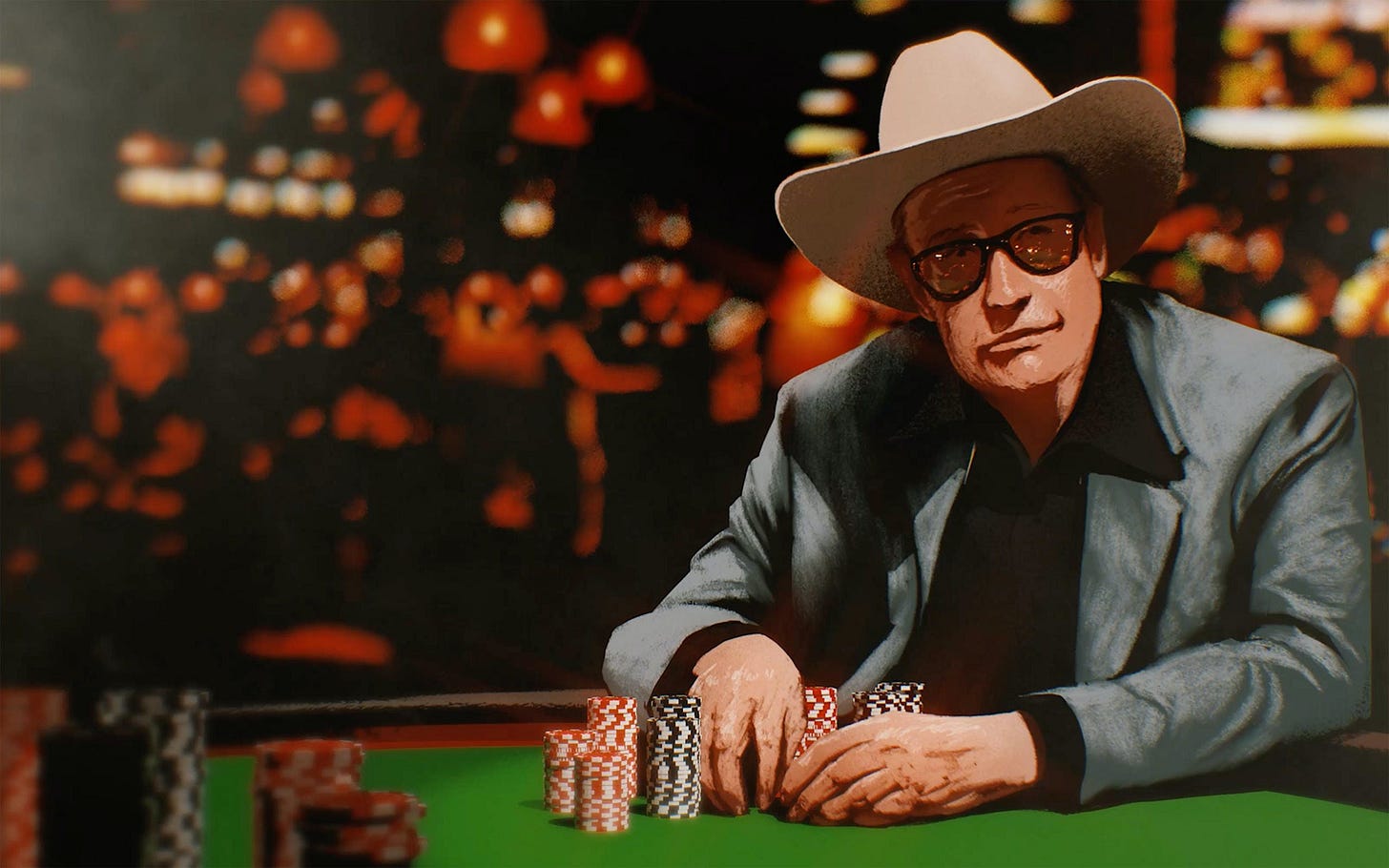The Wolf Den #738 - Could You Lose If You Tried?
Intentionally losing in markets is harder than you think.
Welcome to The Wolf Den! This is where I share the news, my ideas about the market, technical analysis, education and my random musings. The newsletter is released every weekday and is completely FREE. Subscribe!
Sign up for my other newsletter, THE DAILY CLOSE!
I built The Daily Close to give you the same institutional-grade indicators and signals that I use to trade the market on a daily basis. It's automatically generated and delivered to your inbox at the daily close everyday.
1 Week FREE for all subscribers
17% discount if you subscribe for a year
$25 a month, or $250 a year
In This Issue:
Could You Lose If You Tried?
Bitcoin Thoughts And Analysis
Altcoin Charts
Legacy Markets
Attendance Is Everything
Uniswap May Build On Base
RIP Sam Zell and Doyle Brunson
Bitcoin Vs. US Debt Ceiling | Live Panel With S&P Global DeFi Team
Could You Lose If You Tried?
For traders and investors, the primary aim remains the same: profit. Success is quantified by surpassing benchmarks, reaching all-time highs in portfolio value, and making profitable trades; winning is the ultimate objective.
Yet, if victory is the goal, does it imply that losing is easy? Could anyone just be a loser? It may seem like an unusual question, but have you ever pondered whether you could deliberately lose in the market? The task might prove to be more challenging than expected.
Michael Mauboussin, a name you may not know, is recognized for introducing the concept that if you can lose intentionally, it implies a degree of skill. Let's examine a few instances to understand the challenge of losing.
Chess
Chess is a skill-intensive game devoid of chance. Every player starts on an equal footing, with complete information, and the outcome is determined by strategy. The game rewards superior problem-solving skills. A chess grandmaster can intentionally lose a match with ease.
Basketball
Basketball is primarily a skill-based game with some element of luck. Each player contributes unique skills to the team, but factors like referees, audience, and injuries can affect the outcome. Team composition in terms of size, speed, strength, and chemistry also play a significant role. A basketball player, with some effort, can lose deliberately.
Investing/Trading
The market is a game of luck with some skill. Factors like inefficient markets, human emotions, black swans, news headlines, rumors, lawsuits, and politics influence returns. Yet, when we employ strategies such as stop losses, paper trading, research, technical analysis, behavior analysis, and adjusting time frames, skill comes into play. Ensuring a loss in the market entails some level of skill.
Casino
Casino games are purely dependent on luck. They operate on mathematical principles and random number generators to ensure unpredictable results. Players can't influence the outcomes, and there's no certainty of losing. Even a poker player dealt with good cards might find it challenging to lose. In these games, losing is only slightly more probable than winning.
From these scenarios, we can deduce that if a task requires skill, losing becomes straightforward, and if it's based on luck, losing turns into a gamble. Now, let's delve deeper into the dynamics of markets.
Consider a hypothetical scenario: I organize a trading competition with 100 participants, each starting with $100 on the same platform without leverage. The victor is the one with the most money in their account after three months. One could reasonably expect 5 to 10 traders to outperform the majority, who would likely mirror the market's performance. A significant portion of the participants would probably underperform the major market indices by a small to medium margin.
Now, envision the same experiment but with a twist. The winner is the trader with the least money left after three months. Their goal is to pick losers. Contrary to what you might expect, I predict the results would resemble the previous competition. Likely, a handful of traders would manage to pick consistent losers, breaking away from the pack, while the majority would still reflect the market's performance. Even with the intention of losing, market forces largely dictate outcomes.
John Rogers, the founder of Ariel Capital Management, has conducted a similar experiment.
“I asked 71 of my associates to pick ten stocks that would underperform the market in the second quarter. Only 19 of them succeeded, meaning 73% of them tried to lose on purpose but couldn’t. Indeed, the average return on the try-to-lose portfolios was 30%, double the market’s return. The lesson: Short-term stock movements are more a function of luck than skill.”
Interestingly, John Rogers also relates an example from basketball, where he beat Michael Jordan in a one-on-one game.
“At Michael Jordan's fantasy basketball camp, I was the first person to beat Jordan in a one-on-one game to three scores. Clearly, a former Princeton basketball player does not possess the same level of skill as the greatest NBA player of all time. Had we played to 21 baskets, I wouldn't have stood a chance of winning.”
If you've read this far, don't feel overwhelmed. Understanding that this introduction is comprehensive, let's distill the key points. The first realization to accept is that investing and trading involve an element of luck. This is evident because if I instructed you to lose right now, there's a reasonable chance you might inadvertently make a profit.
The second point is that we can mitigate the impact of luck by increasing the number of attempts and extending our time horizon. This approach might reveal our true skill level while diminishing the influence of randomness and chance. Luck may play a role on some days, but it won't determine an entire career. Adopt a long-term perspective when it comes to markets, and you might just end up winning without depending on luck.
Bitcoin Thoughts And Analysis
At the moment, it appears we have confirmed the head and shoulders pattern and had a bearish retest of the neckline as resistance. This should see price continue to drop, although the 100 MA is still holding as strong support.
I continue to watch for a drop to $25,212 or even a bit lower, and then to see price head up. But my crystal ball is no better than yours!
Legacy Markets
The German DAX Index is on track for a record close as a broad rally uplifts European stocks. The optimism stems from signals that US politicians might reach a debt-ceiling deal soon, boosting investor confidence. Markets worldwide are performing well; the S&P 500 recently hit a nine-month high, and the Nikkei 225 reached a 33-year peak. Meanwhile, the DAX Index's 0.7% gain brought it close to its first record since January 2022.
President Joe Biden expressed confidence that Congress would act in time to avoid a default. There are ongoing plans for votes on a bipartisan deal in the coming days. The growing optimism is slightly tempered by uncertainty over the Federal Reserve's potential interest rate adjustments.
European stocks are currently a popular trade due to falling energy prices and China reopening, although there's skepticism about the rally's sustainability. Strategists predict that the Stoxx Europe 600 Index might fall to 450 points by year-end, indicating a drop of around 3% from Wednesday's close.
S&P 500 futures remained unchanged, and Treasuries were flat following a Thursday sell-off indicating that traders anticipate the Federal Reserve to keep rates higher for longer. Chinese stocks were the exception to the positive trend, with the Hang Seng Tech Index falling by 2.4% due to disappointing sales from Alibaba Group Holding Ltd. Experts suggest the slowdown in China's recovery indicates the central bank might need to implement looser policies going forward.
Key events this week:
ECB President Christine Lagarde participates in panel at Brazil central bank conference, Friday
New York Fed’s John Williams speaks at monetary policy research conference in Washington; Fed Chair Jerome Powell and former chair Ben Bernanke to take part in panel discussion, Friday
Some of the main moves in markets:
Stocks
S&P 500 futures rose 0.2% as of 5:03 a.m. New York time
Nasdaq 100 futures rose 0.2%
Futures on the Dow Jones Industrial Average rose 0.1%
The Stoxx Europe 600 rose 0.7%
The MSCI World index rose 0.2%
Currencies
The Bloomberg Dollar Spot Index fell 0.2%
The euro rose 0.2% to $1.0791
The British pound was little changed at $1.2414
The Japanese yen rose 0.4% to 138.14 per dollar
Cryptocurrencies
Bitcoin rose 0.7% to $26,907.24
Ether rose 0.8% to $1,810.87
Bonds
The yield on 10-year Treasuries declined two basis points to 3.63%
Germany’s 10-year yield was little changed at 2.44%
Britain’s 10-year yield was little changed at 3.96%
Commodities
West Texas Intermediate crude rose 0.4% to $72.15 a barrel
Gold futures rose 0.4% to $1,985.70 an ounce
Attendance Is Everything
Attendance is often a reliable lagging indicator of market sentiment. If you were to transport me ten years into the future to a cryptocurrency conference, I could likely gauge the current market sentiment within ten minutes by simply observing the attendance. It may sound bizarre, but factors such as vacant seats, queues at the restroom, guest appearances, and on-stage behaviors are excellent barometers of the market's mood.
Regarding this year's Bitcoin conference, the anticipated attendance rate is only half of what it was last year, dropping to 15,000 from the previous year's 35,000. The list of speakers this year is also not as extensive as it was last year. Budgets have been reduced, and there's less chatter about after-parties. On the bright side, there's more room for prices to ascend.
This might be our little secret, but when attendees are anxiously queuing up for the restroom, it might signal that it's time to consider taking some profits.
Uniswap May Build On Base
Though not yet confirmed, three prominent Uniswap contributors have expressed interest in constructing Uniswap V3 on Coinbase’s layer 2 solution, Base, upon its mainnet launch. Given that Uniswap has exceeded Coinbase in trading volume over the past four months, such a move could prove significantly beneficial for the centralized exchange. Moreover, it would serve as an excellent publicity opportunity for Uniswap, potentially attracting Coinbase customers.
While Ethereum enthusiasts might not welcome Uniswap expanding its operations beyond the Ethereum ecosystem, it's important to recognize that competition fosters growth in the industry. According to Ultrasoundmoney, Uniswap is currently the third largest consumer of ETH, following OpenSea and transfers over the past two years. Importantly, Uniswap wouldn't abandon Ethereum, it would simply add Base to the list of supported blockchains.
RIP Sam Zell and Doyle Brunson
This week, we extend our heartfelt condolences over the passing of two extraordinary individuals who made significant impacts in their respective domains. Doyle Brunson, a legendary poker player, and Sam Zell, a highly respected real estate investor, both had profound influences on my passion for investing. Known as the 'Godfather of Poker,' Doyle Brunson left behind a legacy of a successful career spanning over 50 years, during which he played a crucial role in elevating the game to the remarkable stakes we see today. Sam Zell, whose illustrious career began in the 1960s, is famed for popularizing the Real Estate Investment Trust (REIT) and founding Equity Residential. We pay tribute to these two influential figures and extend our deepest sympathies.
Bitcoin Vs. US Debt Ceiling | Live Panel With S&P Global DeFi Team
Charles Jansen, Head of DeFi Transformation at the S&P Global, and Charles Mounts, Chief DeFi Officer at S&P Global, discuss the US debt crisis.
The views and opinions expressed here are solely my own and should in no way be interpreted as financial advice. Every investment and trading move involves risk. You should conduct your own research when making a decision. I am not a financial advisor. Nothing contained in this e-mail constitutes or shall be construed as an offering of financial instruments or as investment advice or recommendations of an investment strategy or whether or not to "Buy," "Sell," or "Hold" an investment.












